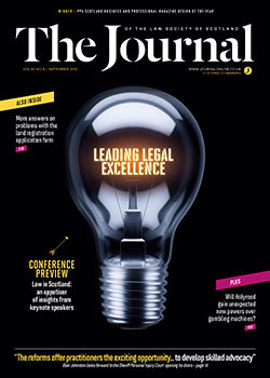Opinion: James O'Reilly
The Law Society of Scotland recently launched a consultation on proposed reforms to the Guarantee Fund, now known as the Client Protection Fund. All members should give it serious consideration, because it could have significant and potentially costly ramifications for many.
Various options are considered, and members will have differing views, but three broad questions must be asked. What is the fund for? Who should pay for it? And, most ambitiously, what other steps can be taken to limit claims?
Claims on the fund can only be made in exceptional circumstances. First, the loss must be occasioned by dishonesty of a solicitor or their employees. Negligence will not suffice, nor are trading debts covered. Secondly, no other remedy may be available. In a partnership, the other partners’ professional indemnity should cover claims against losses caused by a dishonest partner.
The point of the fund for the profession, it follows, is essentially PR, albeit PR the profession is legally mandated to engage in. The fund gets its money from good solicitors and pays it out to members of the public who have been fleeced by bad ones, who in many cases will be leaving the profession. It may be sensible to develop the branding of the fund in a way that firms can adopt it.
With the change of name, it is appropriate to consider who needs to be protected. While it is unarguable that private individuals should, there is something a little quixotic about the idea of clubbing together in case PLCs that may be worth more than the entire profession are duped by a rogue solicitor. I suggest we consider whether big businesses should be required to insure against such risks, as they do with other risks. Indeed, under the current guidelines, the fund will take account of the extent to which insurance does cover a loss.
The next question, if a fund is conceived from the ground up, is who pays. In my view, we should not stray too far from the current basis, being the owners of firms that handle client money. The fund, in effect, acts as insurance against a bad solicitor or employee stealing from a client. Some who work in-house do not have the opportunities for peculation that come with certain types of practice. More than that, those who are not principals do not have the same ability to stop wrongdoing in the cashroom.
While there is a case for limiting contributions to those whose conduct is being insured against, on the grounds that it is from their number that the problems arise, the moral hazard argument only goes so far. The dishonest solicitor does not pay the client; the fund pays the client and can only seek recovery from the bad solicitor, which may not be feasible. In reality, the fund is maintained through some form of capitation on solicitors or a subset of solicitors, and the innocent many will pay for the wrongdoing of the few.
Another topic mooted by the consultation is capital adequacy requirements. It is tempting to see this as a panacea; I have some sympathy with the concept, but I also have concerns. One advantage of law as a profession is that it is comparatively cheap to set up a firm in terms of equipment. Many solicitors start with little more than a laptop and a mobile phone. Increasing the cost of starting up a law firm might have an effect on the profession of tomorrow. Since the fund does not deal with trading debts, and given that firms with two or more partners would anyway have PI insurance against the risk of one partner acting dishonestly, a capital adequacy requirement would seem only really to be necessary for single-partner firms.
For similar reasons, although I welcome the idea of a debate about a possible whistleblowing duty, I suspect that such a duty would not have a great impact on the fund’s exposure to claims. One has to consider who would actually know about dishonesty on the part of a solicitor, and how. A firm in which all the partners are engaged in dishonesty is conceivable, but otherwise the reality is that it is unlikely that other members of the profession would get the chance to know that something dishonest was being done unless they or their clients were affected, whilst within a firm other partners already have the strongest possible incentive to keep the place honest. I don’t think the profession has a culture of winking at dishonesty.
I look forward to a robust debate within the profession and urge all colleagues to take part.
James O’Reilly is a procurator fiscal depute based in EdinburghThe views expressed are personal and not those of the Crown Office & Procurator Fiscal Service For a fuller version of this article see bit.ly/1Oa5KyC To access the consultation, which is open until 9 October 2015, go to bit.ly/1Pun9Tb
In this issue
- Good health – fair question?
- Time to raise the age of criminal responsibility
- Adoption of foreign children – a clash of cultures?
- Presumed liability: the case for action
- Le Bief Bovet: 700 years of litigation
- Reading for pleasure
- Opinion: James O'Reilly (fuller version)
- Opinion: James O'Reilly
- Book reviews
- Profile
- President's column
- Land Register completion update
- People on the move
- Conference calls
- A new court rises
- Questions of form
- Charities - why reserves matter
- Place your bets
- Pensions: a formula unravelled
- Whereabouts unknown?
- Lego Man keeps his mark
- The company one keeps
- Scottish Solicitors Discipline Tribunal
- Land, leases and LBTT
- Big budget brief
- Support sought as Napier joins the law clinics
- Public Guardian's fees to increase
- Law reform roundup
- TCPD: the Update way
- How are we doing?
- Thanks, but no thanks
- Ask Ash






